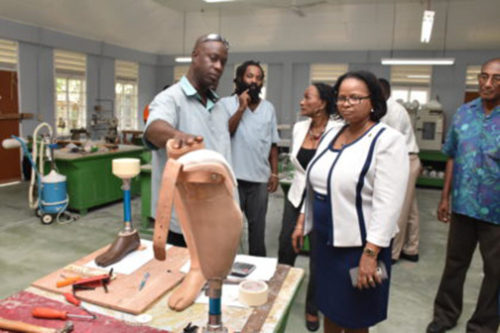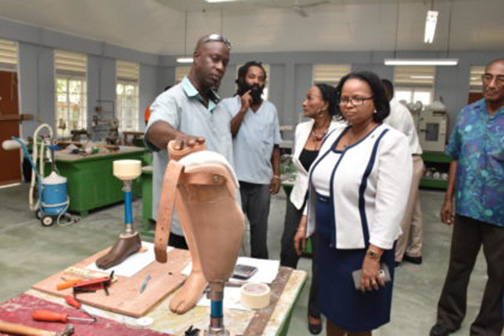Accessibility remains one of the biggest challenges for persons with disabilities and it places limitations on them particularly as regards the level the education they are able to attain.
During the celebration of Rehabilitation Week last week, Director of the Ptolemy Reid Rehabilitation Centre Cynthia Massay noted this with concern, pointing out at least two instances where this was the case.
The centre caters to the needs of those with disabilities and after 50 years, continues to set an example by filling a gap that exists in the mainstream education system, and by extending its services beyond educating, to providing employment for persons with special needs.
Aside from the lack of physical access, Massay pointed out that there are also deficiencies in special needs training at the teaching level.
She cited the case of a student who attends the centre who was able to attend a city primary school and write the National Grade Six Assessment recently after they found a single school that was accessible for the student, as it is flat.

Furthermore, she boasted that the typist employed at the centre who is a wheelchair user, speaks brilliant English, and was able to cop a number of CSEC subjects, but she was unable to attend the University of Guyana because of the limitations of its physical infrastructure.
At Ptolemy Reid, the curriculums taught are tailored especially for the school, for the education of special needs children. The students are taught based on their level and types of ability, with computers and tablets utilized in the classrooms to provide assistance.
The aim, Massay shared, is that hopefully some of these students can eventually be integrated into the mainstream education system, although she acknowledged that only a small number usually make it there. Wherever possible, efforts are made to have the children sit national exams if they are capable, although she related that sometimes it happens that those students are older than their peers at corresponding grade levels.
But as she noted, “Children are going to become adults, and adults who are not educated will be left behind.”
Providing employment to persons with disabilities
“What caught my attention is their policy to employ persons who have passed though the institution, which tells you that the institution is providing a service that is not catered for in the education system to our children with special needs because they do grow up and they become adults…,” Minister of Public Health Volda Lawrence commented following a tour of the institution on Wednesday last.
Massay stated that hiring individuals with disabilities is a policy of the centre; she was quick to note that they are not employed simply because they have a disability, but would have been trained for the positions they hold.
Currently, there are three nurses, two teachers, a cook/maid, a laundry room attendant and a typist on staff with special needs, ranging from autism to physical disabilities. The centre provides teaching, vocational training and rehabilitation services, as well as daycare and afterschool care programmes.
Massay related that about eight children are housed there permanently, with some of the students being temporary residents. That is, they come in on Mondays and leave on Fridays.
Massay explained that that reason for this is that some of the students travel far distances to access the services of the Ptolemy Reid Rehabilitation Centre, an issue she hopes can be addressed in the future, by having similar centres established in other areas.
On that note, she indicated that space at the institution already poses a problem because there are many more students who would like to access the services offered by Ptolemy Reid but cannot.
Staffing and volunteer support
In addition to the 60 employees on staff, the centre also receives volunteer support from locals and foreigners. Yearly, physiotherapy and occupational therapy students from the Misericordia and Scranton universities in Pennsylvania travel to Guyana to volunteer at Ptolemy Reid. Massay said that from the collaboration, not only can they share their expertise, but the students also learn from the practices being employed here, and see what can be done when even less resources than they usually have access to are available.
Additionally, students from the University of Guyana who are involved in the new Medical Rehabilitation programme usually have practical sessions there. Massay highlighted that there are only two technicians in the prosthetics workshop, the only two qualified in the country. She stated that if they were to migrate, as so many have done, or fall ill, the delivery of the service would be tremendously impacted.
She noted, however, that last year a programme was implemented to train technicians within the unit, and now that the theoretical aspect has been completed, they are awaiting the appointment of the trainees to the vacant positions. Notably, trainees were seen working in the lab with the technicians on Wednesday, including a student on work study.
Ministry support
Meanwhile, Lawrence highlighted several areas where the ministry would work to see improvements to the centre, including exploring how the costs for prosthetics can be reduced.
Lawrence had stated also that the Ministry of Public Health can work along with the Ministry of Finance and the Guyana Revenue Authority to ensure that donations to the facility are received quickly and collaboration with the Ministry of Social Protection can be done to ensure that individuals are able to access the services that are available.
She congratulated the staff, management, board and volunteers, urging others to assist wherever possible.
Director of Rehab Services at the Ministry of Public Health related that the ministry’s aim during the week’s outreach activities was to equip persons in the community with knowledge needed to understand disability, and to be able to help individuals with disabilities within their communities. Mangar stated that the Ministry of Public Health offers physical therapy, occupational therapy, speech therapy, audiological services and home care for persons with disabilities at the Ptolemy Reid Rehabilitation Centre and the Cheshire Home, as well as vocational training for young adults at the Open Doors Centre.
One new initiative being pursued, Mangar shared, is the testing of the hearing of all newborns before they leave the hospital, which will extend to hospitals in Essequibo.
This was officially launched on Wednesday. Rehabilitation Week was held under the theme ‘Reaching out and Empowering Communities’.






